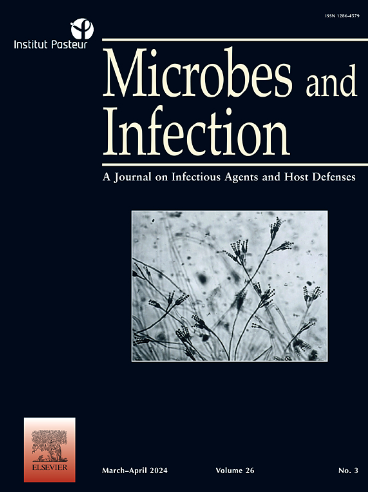Lung infection with classical Klebsiella pneumoniae strains establishes robust macrophage-dependent protection against heterologous reinfection
IF 2.6
4区 医学
Q3 IMMUNOLOGY
引用次数: 0
Abstract
At present, there is no approved vaccine for prevention of infection by the opportunistic bacterium Klebsiella pneumoniae (Kp); success in treating these infections is increasingly challenged by the spread of antibiotic resistance. Preclinical investigation of adaptive immunity elicited by lung infection with live classical Kp may reveal host mechanisms of protection against this pathogen. Here, we utilize multiple virulent classical Kp strains to demonstrate that following lung infection, surviving wild-type mice develop protective immunity against both homologous and heterologous (heterotypic) reinfection. For Kp strains with low capacity to disseminate from the lung, this immunity is B-cell-independent. We further demonstrate that this immune protection is also effective against subsequent challenge with hypervirulent Kp if the strains share the same capsule type. Systemic inoculation fails to elicit the same protective effect as lung inoculation, revealing a lung-specific immune effector function is responsible for this protection. We therefore utilized clodronate-loaded liposomes to substantially deplete both alveolar macrophages and lung interstitial macrophages, finding that simultaneous depletion of both subsets entirely ablates protection. These findings indicate that following initial lung infection with Kp, lung macrophages mediate protection against ensuing Kp challenge.
经典肺炎克雷伯氏菌菌株的肺部感染可建立对异源再感染的强大巨噬细胞依赖性保护。
目前还没有获准用于预防机会性肺炎克雷伯氏菌(Kp)感染的疫苗;由于抗生素耐药性的蔓延,治疗此类感染的成功率日益受到挑战。对活体经典 Kp 引起的肺部感染所产生的适应性免疫进行临床前研究,可能会揭示宿主对这种病原体的保护机制。在这里,我们利用多种毒性经典 Kp 菌株证明,肺部感染后,存活的野生型小鼠会对同源和异源(异型)再感染产生保护性免疫。对于从肺部扩散能力较低的 Kp 菌株,这种免疫不依赖于 B 细胞。我们进一步证明,如果菌株的胶囊类型相同,这种免疫保护也能有效抵御高病毒性 Kp 的后续挑战。全身接种无法引起与肺部接种相同的保护效果,这表明肺部特异性免疫效应器功能是这种保护的原因。因此,我们利用负载氯膦酸脂质体来大量消耗肺泡巨噬细胞和肺间质巨噬细胞,结果发现同时消耗这两个亚群会完全削弱保护作用。这些研究结果表明,在肺部初次感染 Kp 后,肺巨噬细胞介导了对随后 Kp 挑战的保护。
本文章由计算机程序翻译,如有差异,请以英文原文为准。
求助全文
约1分钟内获得全文
求助全文
来源期刊

Microbes and Infection
医学-病毒学
CiteScore
12.60
自引率
1.70%
发文量
90
审稿时长
40 days
期刊介绍:
Microbes and Infection publishes 10 peer-reviewed issues per year in all fields of infection and immunity, covering the different levels of host-microbe interactions, and in particular:
the molecular biology and cell biology of the crosstalk between hosts (human and model organisms) and microbes (viruses, bacteria, parasites and fungi), including molecular virulence and evasion mechanisms.
the immune response to infection, including pathogenesis and host susceptibility.
emerging human infectious diseases.
systems immunology.
molecular epidemiology/genetics of host pathogen interactions.
microbiota and host "interactions".
vaccine development, including novel strategies and adjuvants.
Clinical studies, accounts of clinical trials and biomarker studies in infectious diseases are within the scope of the journal.
Microbes and Infection publishes articles on human pathogens or pathogens of model systems. However, articles on other microbes can be published if they contribute to our understanding of basic mechanisms of host-pathogen interactions. Purely descriptive and preliminary studies are discouraged.
 求助内容:
求助内容: 应助结果提醒方式:
应助结果提醒方式:


